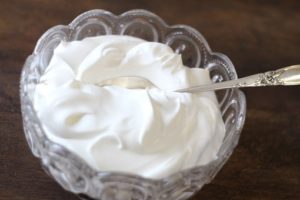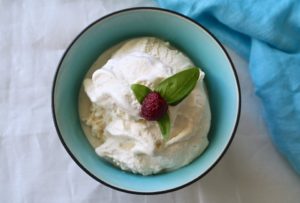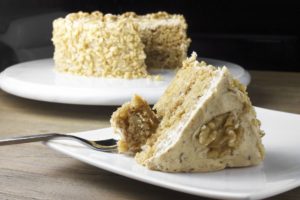DAIRY-FREE COCONUT WHIPPED CREAM RECIPE

HOW TO MAKE DAIRY-FREE WHIPPED
CREAM from COCONUT CREAM
* See Health Benefits of Coconut Cream (below)
Whipped coconut cream is perfect for topping
desserts like pie, hot cocoa and ice cream.

It’s also ideal for French toast, pie fillings, mousse,
and even no-churn ice cream!

Total time 10 mins. Servings: 2.5 cups
An easy, step-by-step recipe for how to make
coconut cream whipped cream! Perfect for topping vegan
and non-dairy desserts calling for whipped cream.

Ingredients:
1 14-ounce can (414 ml) coconut cream or full fat
coconut milk*
1/4 – 3/4 cup (28 – 84g) icing/powdered sugar
(Powder coconut or raw sugar in a coffee grinder)
(organic for vegan friendliness)
optional: 1/2 tsp vanilla extract
Instructions
Chill your coconut cream or coconut milk in the
refrigerator overnight, being sure not to shake or tip
the can to encourage separation of the cream and
liquid. See notes for more insight / troubleshooting.
Look on the can for coconut cream that has 75% to
95% coconut and 20-22% fat. *See health benefits
of Coconut Cream below.

The next day, chill a large mixing bowl 10 minutes
before whipping. Remove the coconut cream or milk
from the fridge without tipping or shaking and
remove the lid. (If your liquid ends up on top, pour it into
a container in the fridge for future use)
Scrape out the top, thickened cream
and leave the liquid behind (reserve for use in
smoothies).
Note: if your coconut cream didn’t harden, you
probably just got a can without the right fat
content. In that case, you can try to salvage it with a
bit of tapioca flour – 1 to 4 Tbs. – during the whipping
process. That has worked for me several times.
Place hardened cream in your chilled mixing bowl.
Beat for 30 seconds with a mixer until creamy. Then
add vanilla (optional) and powdered sugar and mix
until creamy and smooth – about 1 minute. Taste and
adjust sweetness as needed.
Use immediately or refrigerate – it will harden and set
in the fridge the longer it’s chilled. Will keep for up to
1 week.
Notes
*Using coconut cream yields more coconut whipped
cream than using full fat coconut milk, because it
contains more cream and less liquid.
I look for 75% to 95% Fat. Finding a good
brand without additives is important. The ingredients
should be only coconut and water,
*This is not my original recipe or concept, rather one
I’ve adapted from many other bloggers.
A quarter cup of coconut milk (full-fat/not skimmed or light milk) has about: (1)
- 138 calories
- 1.5 grams protein
- 2 grams sugar
- 14 grams fat
- .55 milligrams manganese (27 percent DV)
- .15 milligrams copper (8 percent DV)
- 60 milligrams phosphorus (6 percent DV)
- 22 milligrams magnesium (5.5 percent DV)
- 3.9 milligrams iron (5.5 percent DV)
- 157 milligrams potassium (4.5 percent DV)
* Health Benefits of Coconut Milk
From www.draxe.com
1. Improves Heart Health by
Lowering Blood Pressure and Cholesterol
Coconuts are one of the best sources of lauric acid — 50 percent
of the fat in coconuts is lauric acid, which has antibacterial and
antiviral activities. According to many studies, lauric acid is a
protective type of fatty acid linked with improved cholesterol levels
and heart health.
Researchers found that “coconut fat in the form of coconut milk
does not cause a detrimental effect on the lipid profile in the general
population, and in fact is beneficial due to the decrease in bad LDL
and rise in good HDL cholesterol.”
2. Because coconuts contain minerals important for circulation and
controlling blood flow, coconut milk is also useful for lowering
blood pressure and keeping blood vessels flexible, elastic and free
from plaque buildup. For example, magnesium may help combat
stress and muscle tension while aiding in circulation and keeping
muscles relaxed, important for preventing heart attacks.
3. Provides Electrolytes and Prevents Fatigue
Although coconut water is a higher source of electrolytes, coconut milk
also provides important minerals needed to maintain blood volume,
regulate heart health, and prevent dehydration or diarrhea. Especially
in very hot weather, following exercise or after being sick, electrolytes
help prevent exhaustion, heat strokes, heart problems, muscle aches
or cramps, and low immunity.
Coconut milk also contains the types of MCTs that are easily used by
your brain for energy, without even needing to be processed through
your digestive tract with bile acids like some other fats. Coconut milk’s
calories provide a quick and efficient source of healthy calories for the
brain, which is actually primarily made up of fat and relies on a steady
stream of it to function.
4. Helps Lose Weight
According to a study done by the School of Dietetics and Human Nutrition
at McGill University, consumption of a diet rich in MCTs results in greater
loss of fat (adipose tissue) compared with long-chain fatty acids, perhaps
due to increased energy expenditure and fat oxidation observed with MCT
intake. MCTs may be considered as agents that aid in the prevention of
obesity or potentially stimulate weight loss.
As a food high in MCTs, coconut milk is a very filling, fat-burning food.
Fats provide the feeling of being full and satisfied and can help prevent
overeating, snacking, food cravings and potentially weight gain.
Of course, portion control is important considering the calorie count of
coconut milk, but as a part of a healthy diet it provides necessary fatty
acids in addition to other minerals that support weight loss and detoxification.
Coconut milk is also hydrating and helps the digestive organs, like the liver
and kidneys, function properly, which helps metabolize fat and remove waste
from the body.
5. Improves Digestion and Relieves Constipation
A well-hydrated digestive tract is important for preventing or
treating constipation. Coconut milk nourishes the digestive lining due
to its electrolytes and healthy fats, improving gut health and preventing
conditions like IBS.
6. Manages Blood Sugar and Controls Diabetes
The fat content of coconut milk can help slow the rate at which sugar
is released into the bloodstream, better controlling insulin levels and
preventing a “sugar high” or worse, conditions like diabetes. This is one
reason why coconut milk is especially good to add to sweetened recipes,
like desserts. Coconut milk’s MCTs are also a preferred source of energy
for the body rather than sugar.
7. Helps Prevent Anemia
Although the iron content of coconut milk isn’t very high, it
still provides a good source of plant-based iron that can
contribute to a diet sufficient at preventing anemia.
8. Prevents Joint Inflammation and Arthritis
Coconut milk’s MCTs can help lower inflammation, which is
associated with painful conditions like arthritis and general
joint or muscle aches and pains. Coconut milk in place of refined
sugar especially is helpful for people with arthritis (or other
autoimmune conditions) because sugar is a pro-inflammatory
and linked to low immunity, worsened pain and swelling.
9. Prevents Ulcers
Another benefit of coconut milk nutrition that may surprise you?
Researchers found that coconut milk can help reduce the occurrence of
ulcers even better than coconut water. When rats with ulcers were given
coconut milk, they experienced a reduction in the size of ulcers of about
56 percent. The study found that coconut milk had protective effects on
the ulcerated gastric mucus that can lead to painful ulcers.
Which Kind of Coconut Milk is Best to Buy?
It’s simple enough to make coconut milk yourself at home, but if you’d rather buy a premade
kind, look for the purest coconut milk you can. The best kinds of coconut milk are organic and
contain no added sugar or sweeteners, preservatives, artificial sweeteners, and aren’t
pasteurized (which can potentially destroy some of the nutrients).
Look for coconut milk (ideally organic) that’s been “cold pressured,” which indicates it’s only
been lightly heated and processed to remove certain bacteria but hasn’t been exposed to high
heat that can deplete vitamins and minerals. Skip any coconut milk (or water) that’s flavored
with juices, sweeteners, colors or other ingredients. You’re better off adding your own if you
want to improve the flavor.
The primary ingredient should be 100 percent coconut milk and maybe coconut water.
Some companies also add guar gum, which is a natural product used to stabilize the texture.
Make sure the label indicates the milk is unsweetened to avoid a total sugar bomb.
One final note: If you buy canned coconut milk, avoid cans made with the
chemical called BPA. BPA is found in some aluminum cans and has the potential
to cause certain health problems when it leashes into foods (especially foods high
in acid or fat, like coconut milk). Although the FDA still considers it safe, many
nutrition experts disagree due to certain studies linking it to behavioral problems
and other health concerns. Look for an indication that the can is made without
BPA and is “BPA free.”





You must be logged in to post a comment.